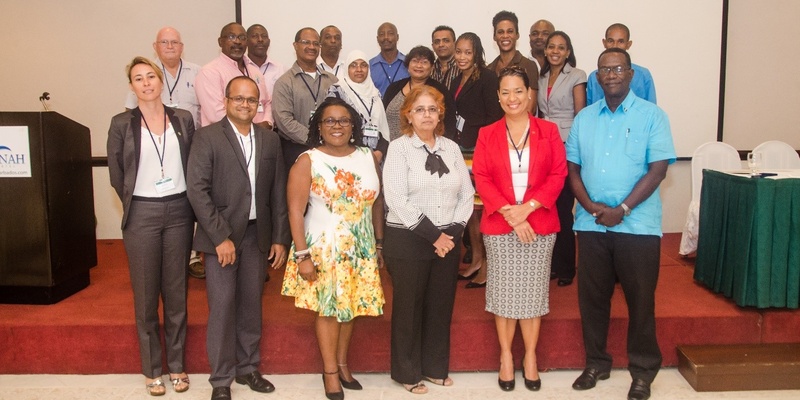The 2017 IPPC Regional Workshop for the Caribbean Successfully Held in Bridgetown Barbados
Posted on Чт, 21 Сен 2017, 09:23

IPPC 2017
The 2017 IPPC Regional Workshop for the Caribbean was held from 13 - 15 September 2017 in Bridgetown, Barbados. The workshop was jointly organized by the FAO Sub-regional Office for the Caribbean, the newly formed Regional Plant Protection Organization (RPPO) the Caribbean Agricultural Health and Food Safety Agency (CAHFSA) and the Inter-American Institute for Cooperation on Agriculture (IICA). The workshop was chaired by Mr Michael James and vice-chaired by Deanne Ramroop, and attended by 19 participants from 11 countries. The Representative of the IICA Barbados Delegation Mrs Ena Harvey, the Plant Production and Protection Officer from FAO Barbados Dr Vyjayanthi Lopez, and the representative of Agriculture, Food, Fisheries and Water Resource Management Mr Leslie Brereton, delivered a welcome address, respectively.
The workshop gave RPPO CAHFSA the opportunity to increase its visibility and recognition by NPPOs within the region. CAHFSA Plant Health Specialist Juliet Goldsmith presented the mandate of CAHFSA as well as its intended areas of focus, including Standards and their Implementation, Capacity Building, Rapid Response and Safeguarding Mechanisms, Information Exchange, and International and Regional Cooperation. Ms. Goldsmith highlighted the value of the IPPC to countries in the region, and noted that the 2017 IPPC Workshop provided an invaluable platform to gain insight into the phytosanitary issues of relevance to member states that could potentially inform the work of CAHFSA. The IPPC Secretary Representative Sarah Brunel highlighted the overall objective of the workshop, to strengthen the phytosanitary capacities of contracting parties towards effective enforcement of internationally harmonized standards for phytosanitary measures to prevent the introduction of plant pests to their countries, while facilitating the international trade of plant products.
The objectives of the workshop were to analyze and provide comments on draft ISPMs currently under consultation, including the International movement of cut flowers and foliage (2008-005), Requirements for the use of fumigation treatments as a phytosanitary measure (2014-004), and 2017 Amendments to ISPM5 (Glossary of phytosanitary terms) (1994-001). The workshop also updated participants on recent developments of the IPPC including activities related to ISPM14 and the ''Beyond Compliance'' tool, FAO and IPPC monitoring and evaluation activities related to emerging issues in plant health, the IPPC Call on Phytosanitary Treatments, the benefits of the Phytosanitary Capacity Evaluation tool (PCE), the ePhyto project, sustainable funding, and the International Year of Plant Health for 2020. The workshop participants actively discussed the benefits of conducting PCEs and the need to exchange information at the regional level. Activities conducted on the biological control of Pink Hibiscus Mealybug (Maconellicoccus hirsutus) in St Kitts and Nevis were discussed. The electronic import permit application procedure for Trinidad and Tobago was presented and led to an active discussion as well as inspiration for workshop participants.
The workshop report will soon be available at the IPPC Regional Workshops webpage. All specific presentations are available on the 2017 IPPC Regional Workshops presentations webpage.



